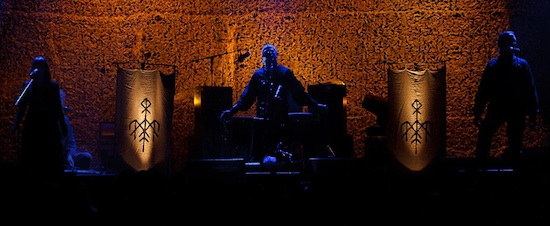Everything is cold, everything is beautiful. Neon lights pulsate in the dusky sky, heavy footsteps crunch through the snow and a hyperborean wind blows. "Stand up from your sleep" sing Norway’s Wardruna, the traditional pagan folk band. All of them are stood, arms aloft and voices raised amongst the dim light, their hand made instruments are scattered about them.
Wardruna (Ward meaning ‘keeper of secrets’ and ‘runa’ rune in Old Norse) are Einar Selvik, cult black metaller Gaahl (of Gorgoroth infamy) and female vocalist Lindy Fay Hella. Taking inspiration from Nordic mythology, they sing in proto Norse and whittle their instruments from wood, animal skin and bone. A triptych of albums contains 24 songs, each representing the Elder Futhark runes (the ancient Scandinavian alphabet) and has led them to here, the cavernous Queen Elizabeth Hall on London’s South Bank to spread the gloom and to intrigue a varied London audience for this, their first show on these shores. There’s the black metal fans of course, for Gaahl is quite an icon. But there’s also the folk traditionalists, swathed in autumnal wools and rune jewellery.
The stage is set in a ritualistic manner, a hand woven woollen backdrop, not unlike a long ship’s sail, unfurls from ceiling to floor and a wooden throne is draped with animal skin. Is it cold in here? It feels pretty cold. Two banners are lowered from the ceilings, each with an Elder Futhark rune hand painted on. The sound of heavy rain and a beating wind fills the theatre and Wardruna, who tonight number six, drift onto the stage, replete in minimal woollen tunics and heavy silver jewellery.
This isn’t dubious folk nostalgia, it’s more like an attempt to re-enchant the world. Wardruna don’t set out to reproduce the sound specific to a region or era, yet are a compelling combination of fragmented elements that hark back to ancient times. This perhaps, is why it sounds so contemporary, it displays elements of a bygone time yet Wardruna are a simulacra, a construct.
Not only are the songs communicative, they also sound functional. Drums have been used throughout time to inspire during battle, or to communicate (like smoke signals) between settlements. ‘Kauna’ (a rune representing light) has a war-like, percussive threat which Gaahl illuminates with soft growling chants in Old Norse. Wardruna live are a journey that’s not too dissimilar to Nicolas Winding Renf’s 2009 eerie epic Valhalla Rising, which wove in and out of the bleak landscapes of Norway, the disorientated band of Vikings pushing through the adversarial weather and heavy fog to reach Valhalla. There’s the battle cry sounding ‘IwaR’ that’s a pretty intimidating percussive chant, not too dissimilar to the sound of a drummer on a longboat that keeps the rowers pulling and pushing in unison. It’s a fearful sound. ‘Jara’ utilises Hella’s eerie vocals, a lonely wail over the beating drum skins as the rest of the band’s voices raise, in an almost celebratory (yet always ominous) chant.
With their roots in Norwegian black metal of the 80s and 90s, Wardruna’s music is highly visual and indelibly entwined with Norway’s magnificent landscapes. They invoke a Norway that possibly only exists in imagination; lonely lakes, misty pine forests and always a winter chill permeating the air, the land of the midnight sun. The sound they create is almost alchemical – they take primitive instruments and create an atmosphere so transcendent, that it’s a shock to leave the theatre and be stood on London’s South Bank. They sneak under your skin, Wardruna, and invoke a nostalgic feeling for a place and time that never really existed. Profound and unique.


